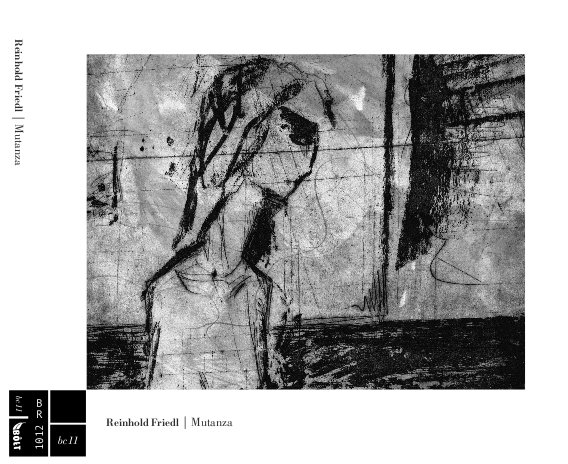Reinhold Friedl – Mutanza

|
Release Date: IV 2012
Total Time: 67:29
CD | ecopack
1. Guero (Helmut Lachenmann) 6:16
2. Epitaff (Reinhold Friedl) 10:34
3. Music in Fifths (Philip Glass) 5:15
4. An American Dream (Mario Bertoncini) 7:08
5. Mutanza (Witold Szalonek) 15:27
6. Music for Piano with Magnetic Strings (Alvin Lucier) 11:35
7. Pan Fried 11 (Phill Niblock) 11:14
Co-released with Bocian Records
This CD presents compositions for piano using the instrument in an unorthodox way. The strings are bowed with nylon strings, stimulated by E-Bows, rubbed with metal, the keys' sound is examined as a corrugated surface and staccato rhythms are repeated in a narrow register. On the one hand, the pieces introduced here explore new ways of playing the piano. In this sense they are "enlarged playing techniques", as they have been developed for most instruments in the second half of the twentieth century. On the other hand, the works confine themselves to selected material and raise the question to what extent the material already is the composition.
This CD presents compositions for piano using the instrument in an unorthodox way. The strings are bowed with nylon strings, stimulated by E-Bows, rubbed with metal, the keys' sound is examined as a corrugated surface and staccato rhythms are repeated in a narrow register. On the one hand, the pieces introduced here explore new ways of playing the piano. In this sense they are "enlarged playing techniques", as they have been developed for most instruments in the second half of the twentieth century. On the other hand, the works confine themselves to selected material and raise the question to what extent the material already is the composition.
To me, it seems less interesting to answer this question, which can hardly be answered unambiguously than to observe that the development of the present music was substantially inspired by electronic music. Mario Bertoncini has expressed this, Helmut Lachenmann has introduced the concept of a "musique concrete instrumentale", Phill Niblocks' loop-like composed music was inspired by the interference between his Harley Davidson and a droning truck ascending the serpentines of the Rocky Mountains. The present CD is a homage to electronic music and moreover, it documents attempts to clear out a gentrified piece of furniture and technically, to catapult the piano into the present.
To me, it seems less interesting to answer this question, which can hardly be answered unambiguously than to observe that the development of the present music was substantially inspired by electronic music. Mario Bertoncini has expressed this, Helmut Lachenmann has introduced the concept of a "musique concrete instrumentale", Phill Niblocks' loop-like composed music was inspired by the interference between his Harley Davidson and a droning truck ascending the serpentines of the Rocky Mountains. The present CD is a homage to electronic music and moreover, it documents attempts to clear out a gentrified piece of furniture and technically, to catapult the piano into the present.
|
|
| This CD presents compositions for piano using the instrument in an unorthodox way. The strings are bowed with nylon strings, stimulated by E-Bows, rubbed with metal, the keys' sound is examined as a corrugated surface and staccato rhythms are repeated in a narrow register. On the one hand, the pieces introduced here explore new ways of playing the piano. In this sense they are "enlarged playing techniques", as they have been developed for most instruments in the second half of the twentieth century. On the other hand, the works confine themselves to selected material and raise the question to what extent the material already is the composition.
|